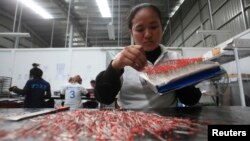A group of labor leaders has written to the European Union urging the bloc not to impose sanctions on Cambodia over the government’s crackdown on the opposition.
Their appeal came after the Supreme Court banned the opposition and the government jailed its leader, Kem Sokha. In the letter, the unionists said that as a developing country heavily reliant on trade with the E.U., sanctions would have a negative impact on the hundreds of thousands of Cambodians working in the textiles and garments sector.
Some 40 to 50 percent of Cambodia’s garment exports end up in Europe, the unions argued, which would make any punitive sanctions extremely damaging to the Cambodian economy.
They added that they were concerned over warnings from the European Union suggesting that it was reconsidering Cambodia’s access to a tariff-free trading scheme called Everything But Arms.
The unions said such a move would make Cambodian garment workers “victims and hostages” of politicians.
George Edgar, E.U. Ambassador to Cambodia, could not be reached.
Pav Sina, president of the Collective Union of Movement of Workers, one of the signatories, said he was concerned that the loss of economic incentives “would seriously affect the income of workers”.
In mid-November, Edgar and another senior E.U. official, Gunnar Wiegand, met Cambodia’s foreign minister, Prak Sokhonn, to raise concerns over Cambodia’s growing democratic deficit.
The bloc said that respect for human rights and democracy was a prerequisite for Cambodia to continue to benefit from the preferential trading scheme.
Heng Sour, labor spokesman, could not be reached.
Unionists Call on E.U. Not to Impose Economic Sanctions on Cambodia
- Hul Reaksmey
- VOA Khmer

Some 40 to 50 percent of Cambodia’s garment exports end up in Europe, the unions argued, which would make any punitive sanctions extremely damaging to the Cambodian economy.
PHNOM PENH —



